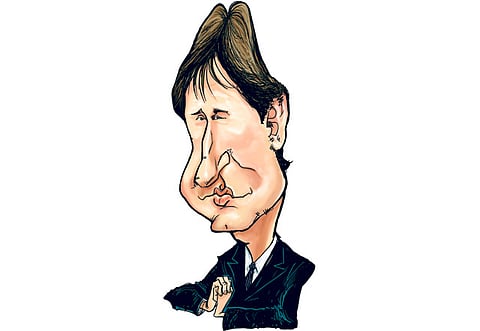Clegg can't allow opportunity to pass
For once, Lib Dems are in a position to demand crucial voting reform

If not now, when? For the first time the prize is within grasp. The people have spoken — and no single party won. Radical reform to an electoral system that has fallen apart is at last on offer. The deadly duopoly between two moribund parties has broken. But will it be cobbled together again as if nothing had happened?
All depends on the nerve of Nick Clegg. Has he the spine and the iron resolve to stick to the one condition that offers a chance of a progressive future? As he cuts through the thickets of negotiations, his sword has been bent by seats lost, not won. He is weakened by that grand surge that fell back to earth like a dead flare. Why did that happen? Because he was crushed yet again by the boa constrictor first-past-the-post electoral system. Yet again his party won a quarter of the votes but only a tenth of the seats. People with a mind to vote Lib Dem understood the wicked ways of first past the post, and voted tactically — avoiding a wasted vote where Lib Dems could never win. What else could they do? This is his chance to bring in the better politics that is the only point of his party.
Against him will be a press determined to blast him into submission to get Cameron into Downing Street, trumpeting bogus outrage. Against him is the bad British tradition left by the warped first-past-the-post system that the "winner" takes all, even though Cameron has hardly more than a third of the vote. To a country bewildered by the politics of hung parliaments, Cameron looks like the legitimate king. But as many people refused to vote as voted Conservative. A Lib-Lab coalition would command 53 per cent of the vote. From the strength of Clegg's resolve in those three debates, he seems to have the mettle to withstand the media blunderbuss.
Clegg is the guardian of the torch kept alight through eons of Lib Dem campaigns for electoral reform, through decades of meetings in dusty halls on wet Thursday nights, through the pamphlets, the petitions, the impassioned explanations on the doorsteps. He cannot trade this core principle for the miserable mess of pottage offered by Cameron. If the man was tempted by the trappings of office, would he be a Lib Dem at all?
Condescending
Cameron's offer of an "all-party committee of inquiry" into political and electoral reform was about as generous as handing down his old clothes to the servants. All he did was invite Clegg with lofty condescension to sign up to his own manifesto. Go round the tradesman's entrance and leave your muddy Europe, immigration and defence policies outside the door. Clegg will surely not be doffing his cap in that direction.
Inadvertently, Cameron has legitimised the idea of a coalition. By opening the bidding, he has made this an equal choice for Clegg.
With uncharacteristic elegance and courtesy, Gordon Brown said it is for Cameron and Clegg to see if they could form a government. If Clegg finds the offer of outdoor work in Cameron's garden is not for him, then an invitation for tea with best china in Downing Street, warmly greeted as an equal partner, might be more congenial. There were those around Brown suggesting he should make a clunking assertion of his constitutional rights as primus inter pares and all that sham. Wiser counsel prevailed. Wait and see. Let them talk. "If Clegg signs up to what Cameron and Osborne plan, he signs his suicide note," said one Cabinet minister.
So Clegg picks his way across the minefield. Would he rather be torn to shreds by the Cameron cuts or blown up for keeping a most unpopular prime minister in power? There is only one path that saves him from annihilation — a guarantee that whomever he sustains in power will give him that referendum, so that at the next election a fairer voting system will give him the seats to match his votes.
The buzz among Cabinet ministers and others is of a coalition of the heart, not of mere opportunism. Take the best of the Lib Dem and Labour manifestos and they blend well, better than either on it is own. Compass, the centre-left lobby, sees this as the most radical programme. There are not many policy sticking points.
The great stumbling block is the same as ever — Brown. Can they ally themselves with him? Had he bowed out long ago, Labour might not have lost under a new leader. But there he is, and there is no removing him now. The legitimacy of a Lib-Lab coalition depends on the Queen calling on him. It stretches credulity to see the man from the tight cabal opening up, yet the formal workings of a coalition force it on him.
Imagine the reassuring sight of Alistair Darling and Vince Cable working together to steady the markets, deciding together how to cut the deficit with the least damage and the fairest tax rises. Those who believe in electoral reform want exactly this kind of open pluralism.
- Polly Toynbee is the president of the UK Social Policy Association.


